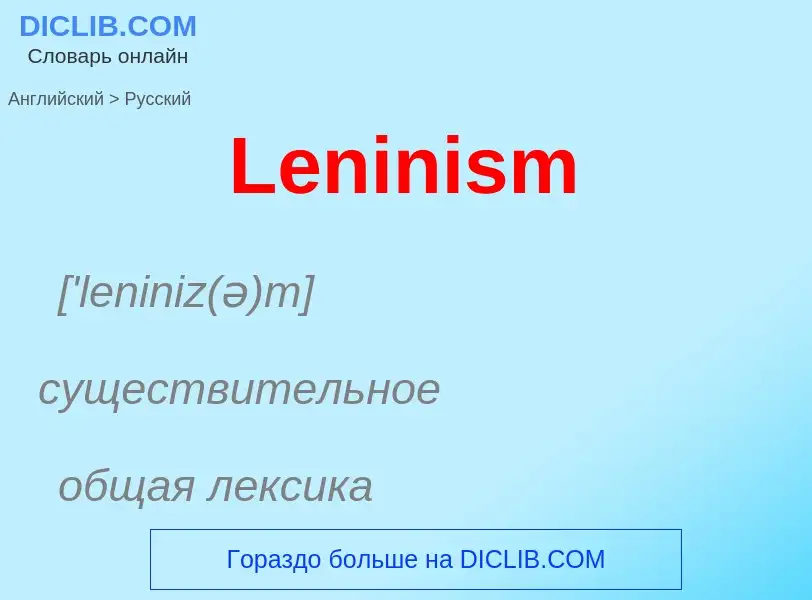Traduzione e analisi delle parole tramite l'intelligenza artificiale ChatGPT
In questa pagina puoi ottenere un'analisi dettagliata di una parola o frase, prodotta utilizzando la migliore tecnologia di intelligenza artificiale fino ad oggi:
- come viene usata la parola
- frequenza di utilizzo
- è usato più spesso nel discorso orale o scritto
- opzioni di traduzione delle parole
- esempi di utilizzo (varie frasi con traduzione)
- etimologia
Leninism - traduzione in russo
['leniniz(ə)m]
существительное
общая лексика
ленинизм
Definizione
Wikipedia

Leninism is a political ideology developed by Russian Marxist revolutionary Vladimir Lenin that proposes the establishment of the dictatorship of the proletariat led by a revolutionary vanguard party as the political prelude to the establishment of communism. The function of the Leninist vanguard party is to provide the working classes with the political consciousness (education and organisation) and revolutionary leadership necessary to depose capitalism in the Russian Empire (1721–1917).
Leninist revolutionary leadership is based upon The Communist Manifesto (1848), identifying the communist party as "the most advanced and resolute section of the working class parties of every country; that section which pushes forward all others." As the vanguard party, the Bolsheviks viewed history through the theoretical framework of dialectical materialism, which sanctioned political commitment to the successful overthrow of capitalism, and then to instituting socialism; and, as the revolutionary national government, to realise the socio-economic transition by all means.
In the aftermath of the October Revolution (1917), Leninism was the dominant version of Marxism in Russia and the basis of soviet democracy, the rule of directly elected soviets. In establishing the socialist mode of production in Bolshevik Russia—with the Decree on Land (1917), war communism (1918–1921), and the New Economic Policy (1921–1928)—the revolutionary régime suppressed most political opposition, including Marxists who opposed Lenin's actions, the anarchists and the Mensheviks, factions of the Socialist Revolutionary Party and the Left Socialist-Revolutionaries. The Russian Civil War (1917–1922), which included the seventeen-army Allied intervention in the Russian Civil War (1917–1925), and left-wing uprisings against the Bolsheviks (1918–1924), was an external and internal war which transformed Bolshevik Russia into the Russian Socialist Federative Soviet Republic (RSFSR), the core republic of the Union of Soviet Socialist Republics (USSR).
As revolutionary praxis, Leninism originally was neither a proper philosophy nor a discrete political theory. Leninism comprises politico-economic developments of orthodox Marxism and Lenin's interpretations of Marxism, which function as a pragmatic synthesis for practical application to the actual conditions (political, social, economic) of the post-emancipation agrarian society of Imperial Russia in the early 20th century. As a political-science term, Lenin's theory of proletarian revolution entered common usage at the fifth congress of the Communist International (1924), when Grigory Zinoviev applied the term Leninism to denote "vanguard-party revolution." Leninism was accepted as part of CPSU's vocabulary and doctrine around 1922, and in January 1923, despite objections from Lenin, it entered the public vocabulary.


![[[Leon Trotsky]] was exiled from Russia after losing to Stalin in the factional politics of the Bolsheviks [[Leon Trotsky]] was exiled from Russia after losing to Stalin in the factional politics of the Bolsheviks](https://commons.wikimedia.org/wiki/Special:FilePath/Bundesarchiv Bild 183-R15068, Leo Dawidowitsch Trotzki.jpg?width=200)
![1970 French edition of Lenin's 1917 book ''[[The State and Revolution]]'' 1970 French edition of Lenin's 1917 book ''[[The State and Revolution]]''](https://commons.wikimedia.org/wiki/Special:FilePath/L'état et la révolution.jpg?width=200)
![Imperialism, the Newest Stage of Capitalism]]'' Imperialism, the Newest Stage of Capitalism]]''](https://commons.wikimedia.org/wiki/Special:FilePath/Ленин В. И. Империализм, как высшая стадия капитализма (1917).jpg?width=200)
